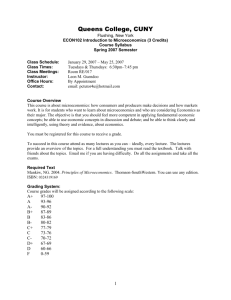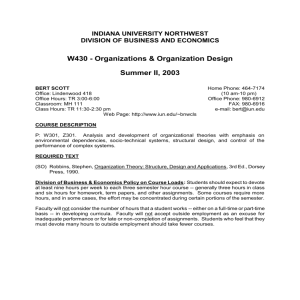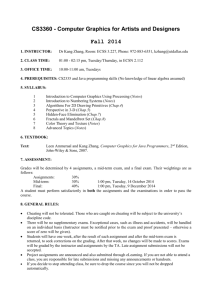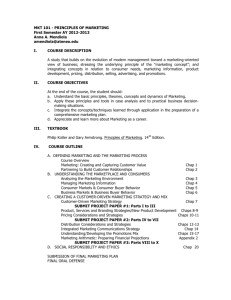MONTCLAIR STATE UNIVERSITY
advertisement
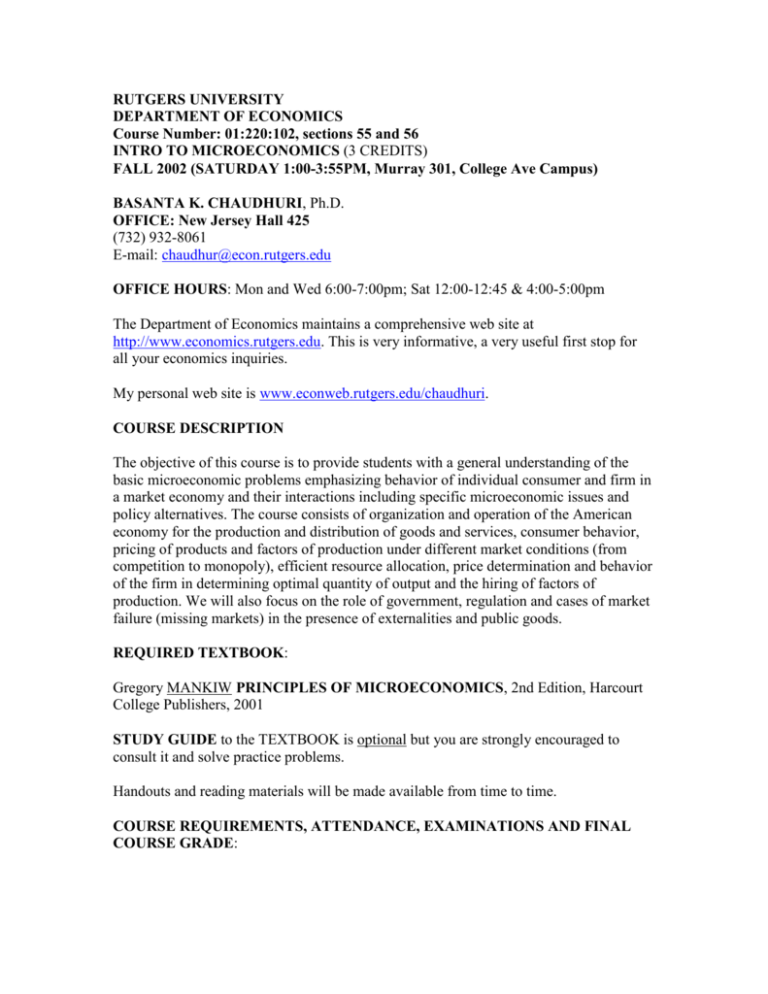
RUTGERS UNIVERSITY DEPARTMENT OF ECONOMICS Course Number: 01:220:102, sections 55 and 56 INTRO TO MICROECONOMICS (3 CREDITS) FALL 2002 (SATURDAY 1:00-3:55PM, Murray 301, College Ave Campus) BASANTA K. CHAUDHURI, Ph.D. OFFICE: New Jersey Hall 425 (732) 932-8061 E-mail: chaudhur@econ.rutgers.edu OFFICE HOURS: Mon and Wed 6:00-7:00pm; Sat 12:00-12:45 & 4:00-5:00pm The Department of Economics maintains a comprehensive web site at http://www.economics.rutgers.edu. This is very informative, a very useful first stop for all your economics inquiries. My personal web site is www.econweb.rutgers.edu/chaudhuri. COURSE DESCRIPTION The objective of this course is to provide students with a general understanding of the basic microeconomic problems emphasizing behavior of individual consumer and firm in a market economy and their interactions including specific microeconomic issues and policy alternatives. The course consists of organization and operation of the American economy for the production and distribution of goods and services, consumer behavior, pricing of products and factors of production under different market conditions (from competition to monopoly), efficient resource allocation, price determination and behavior of the firm in determining optimal quantity of output and the hiring of factors of production. We will also focus on the role of government, regulation and cases of market failure (missing markets) in the presence of externalities and public goods. REQUIRED TEXTBOOK: Gregory MANKIW PRINCIPLES OF MICROECONOMICS, 2nd Edition, Harcourt College Publishers, 2001 STUDY GUIDE to the TEXTBOOK is optional but you are strongly encouraged to consult it and solve practice problems. Handouts and reading materials will be made available from time to time. COURSE REQUIREMENTS, ATTENDANCE, EXAMINATIONS AND FINAL COURSE GRADE: There will be three examinations and three quizzes. The final course grade is a weighted average: Quizzes (20%), Mid-Term I (25%), Mid-Term II (25%), Final (30%). Materials covered in each exam (including the final) are not cumulative. You are responsible for what is covered in lectures and for all required readings in the text. Examination will consist of multiple choice questions and/or short answers and quizzes will be based on multiple choice and/or short answers. “Improvement” in scores will be taken into consideration case by case. There will be no “special case” term papers/book reports/case studies available to any student. Periodical assignments are optional but you will find them very useful. Academic honesty: Any form of cheating (if suspected and proved) during examinations will be dealt with appropriately (i.e., you may end up getting a zero score on that exam/test with no opportunity to make-up the examination). It is your responsibility to be prepared for the examinations on announced dates. WITHOUT EXCEPTION, the third (FINAL) examination will be administered during the final exam week as specified in the Fall 2002 Schedule. Normally, there will be no make-up quizzes/examinations, except in dire and documented emergencies. Any makeup quiz/examination which is allowed (for valid documented reasons) will be administered during the Final Examination Week. There will be no exceptions. However, the make-up quizzes/examination may consist of multiple choice questions and/or essay questions. Missed examinations which are not allowed to be made-up, or are not madeup, will be averaged into your final grade as a zero (i.e., if you miss an examination you will not receive automatically an incomplete course grade). ATTENDANCE and CLASS PARTICIPATION: Students are encouraged to attend lectures on a regular basis and are expected to come, prepared, to every class. Your behavior in the classroom is expected to be courteous, respectful and professional. I strongly encourage your class participation at every available opportunity. Attendance will be checked. Your prompt arrival to class and not disturbing the class during its duration are highly appreciated. Please turn off your cell phones, beepers and other electronic devices. CONTENT AND SCOPE OF THE COURSE: INTRODUCTION TO ECONOMICS/MICROECONOMICS Chap 1 Ten (Fundamental) Principles of Economics Chap 2 Thinking Like an Economist Chap 3 Interdependence and Gains from Trade Quiz 1 SUPPLY AND DEMAND I: HOW MARKETS WORK Chap 4 The Market Forces of Demand and Supply Chap 5 Elasticity and Its Application REVIEW/MID-TERM EXAM I (Sat, October 5th) Chap 6 Supply, Demand and Government Policies SUPPLY AND DEMAND II: MARKETS AND WELFARE: EFFICIENCY OF MARKETS AND MARKET FAILURE Chap 7 Consumers, Producers, and the Efficiency of Markets Quiz 2 Chap 10 Externalities Chap 11 Public Goods FIRM BEHAVIOR AND THE ORGANIZATION OF INDUSTRY (COST OF PRODUCTION AND PRODUCT MARKETS) Chap 13 The Cost of Production REVIEW/MID-TERM EXAM II (Saturday, November 9th) MARKETS FOR PRODUCTS (output, price and profit/loss under different markets) Chap 14 Firms in Competitive Markets Chap 15 Monopoly Quiz 3 Chap 16 Oligopoly Chap 17 Monopolistic Competition MICROECONOMICS OF LABOR MARKETS (LABOR AS A FACTOR OF PRODUCTION) Chap 18 The Markets for the Factors of Production (Example of Labor Market) REVIEW FINAL EXAMINATION (Saturday, December 21st, 1:00-4:00PM)

